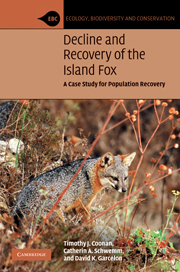Book contents
- Frontmatter
- Contents
- Foreword
- Acknowledgments
- 1 Introduction
- 2 Evolution and genetics
- 3 Social structure, reproduction, mortality and survivorship, and population dynamics
- 4 Food habits, habitat use, activity patterns, and dispersal
- 5 Golden eagles and the decline on the northern islands
- 6 Ecosystem recovery
- 7 Disease and decline on Santa Catalina Island
- 8 Recovery actions
- 9 Recovery actions
- 10 Reproductive biology, by Cheryl Asa
- 11 Diseases of island foxes, by Linda Munson
- 12 Zoos, education, and public participation
- 13 Managing recovery
- 14 The ecological role of island foxes
- 15 Conclusion
- References
- Index
14 - The ecological role of island foxes
Published online by Cambridge University Press: 05 October 2010
- Frontmatter
- Contents
- Foreword
- Acknowledgments
- 1 Introduction
- 2 Evolution and genetics
- 3 Social structure, reproduction, mortality and survivorship, and population dynamics
- 4 Food habits, habitat use, activity patterns, and dispersal
- 5 Golden eagles and the decline on the northern islands
- 6 Ecosystem recovery
- 7 Disease and decline on Santa Catalina Island
- 8 Recovery actions
- 9 Recovery actions
- 10 Reproductive biology, by Cheryl Asa
- 11 Diseases of island foxes, by Linda Munson
- 12 Zoos, education, and public participation
- 13 Managing recovery
- 14 The ecological role of island foxes
- 15 Conclusion
- References
- Index
Summary
Introduction
The conservation of rare species is based on influencing population parameters of abundance, distribution, and rate of change, and in most cases recovery criteria are established that quantify success based solely on the population dynamics of the focal species. Rarely addressed (for good reason) are the ecological impacts that the rareness or absence of a species has on the community from which it has been lost and whether the community responds in any observable way when the species is returned. Models and theories abound on the ecologic value of species (Kareiva and Levin 2003), but examinations of community response to true species extinctions are rare (Doak and Marvier 2003). The extirpation of island foxes from Santa Rosa and San Miguel was a unique occurrence in which the top and only mammalian carnivore was completely eliminated from two ecosystems while community responses were observed. This chapter describes community changes that occurred in response to the loss of foxes and discusses the importance of considering ecosystem impacts as a component of species recovery programs.
Background
Interactions between species affect ecological communities in a myriad of ways (Menge and Sutherland 1987, Thebault and Loreau 2006). Species relationships influence the abundance and diversity of organisms as well as ecosystem processes such as succession, nutrient cycling, and resilience to perturbation (Morin 1999, Brown et al. 2001).
- Type
- Chapter
- Information
- Decline and Recovery of the Island FoxA Case Study for Population Recovery, pp. 167 - 179Publisher: Cambridge University PressPrint publication year: 2010



